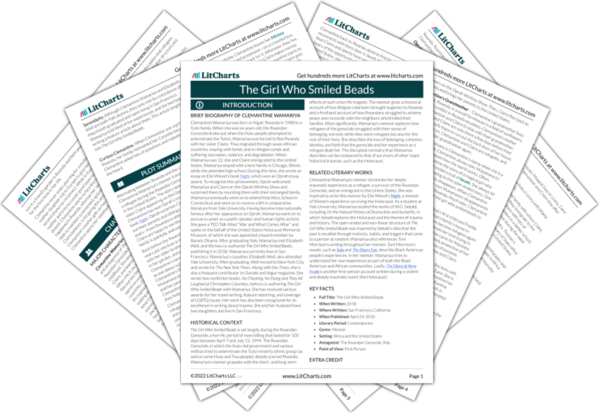Claire Quotes in The Girl Who Smiled Beads
My life does not feel logical, sequential, or inevitable. There’s no sense of action, reaction; no consequence, repercussion; no plot. It’s just fragments, floating.

Unlock explanations and citation info for this and every other The Girl Who Smiled Beads quote.
Plus so much more...
Get LitCharts A+I thought if I stated my name enough times, my identity would fall back into place […] But a name is a cover, a placeholder, not the whole story. A name is a basin with a leak that you need to constantly fill up. If you don’t, it drains and it’s just there, a husk, dry and empty.
I lost myself anyway. Every little thing. I had always loved the fancy soaps at my aunts’ houses. I loved the ones that smelled like geranium and lilac best of all.
That’s life in a refugee camp: You’re not moving toward anything. You’re just in a horrible groove. You learn skills that you wish you did not know: how to make a fire, how to cook maize, how to do laundry in the river and burn the lice on rocks. You wait, […]
But nothing gets better. There is no path for improvement—no effort you can make, nothing you can do, and nothing anybody else can do either, short of the killers in your country laying down their arms and stopping their war so that you can move home.
I now felt I’d made a mistake in Uvira. I’d let my guard down. I’d allowed myself to feel I belonged. But there was no real belonging—not anymore. There was only coming and going and coming and going and dying. There was no point in letting anybody get close.
To be a refugee was to be a victim—it was tautological. And not just a victim due to external forces like politics or war. You were a victim due to some inherent, irrevocable weakness in you. You were a victim because you were less worthy, less good, and less strong than all the non-victims of the world.
It felt surreal and awful. I’d lost track of who I was and who we were to each other. None of us were the same people who’d lived together in that house in Kigali. Those people had died. We had all died.
I understand that forgiveness is utilitarian, that it is likely even the missing piece in my life, the keystone that will allow me to balance and stabilize and keep the bricks of my life from tumbling down. But I can’t do it. To me it feels false.
Every time I need to summon my toughest, most self-actualized persona, I channel [Claire]. […] But […] my most generous feelings [towards Claire] are clouded by my own need to be recognized.
[…]
These days, when I’m with Claire, we have so much love and so much fear, and we want to kill each other.

Claire Quotes in The Girl Who Smiled Beads
My life does not feel logical, sequential, or inevitable. There’s no sense of action, reaction; no consequence, repercussion; no plot. It’s just fragments, floating.

Unlock explanations and citation info for this and every other The Girl Who Smiled Beads quote.
Plus so much more...
Get LitCharts A+I thought if I stated my name enough times, my identity would fall back into place […] But a name is a cover, a placeholder, not the whole story. A name is a basin with a leak that you need to constantly fill up. If you don’t, it drains and it’s just there, a husk, dry and empty.
I lost myself anyway. Every little thing. I had always loved the fancy soaps at my aunts’ houses. I loved the ones that smelled like geranium and lilac best of all.
That’s life in a refugee camp: You’re not moving toward anything. You’re just in a horrible groove. You learn skills that you wish you did not know: how to make a fire, how to cook maize, how to do laundry in the river and burn the lice on rocks. You wait, […]
But nothing gets better. There is no path for improvement—no effort you can make, nothing you can do, and nothing anybody else can do either, short of the killers in your country laying down their arms and stopping their war so that you can move home.
I now felt I’d made a mistake in Uvira. I’d let my guard down. I’d allowed myself to feel I belonged. But there was no real belonging—not anymore. There was only coming and going and coming and going and dying. There was no point in letting anybody get close.
To be a refugee was to be a victim—it was tautological. And not just a victim due to external forces like politics or war. You were a victim due to some inherent, irrevocable weakness in you. You were a victim because you were less worthy, less good, and less strong than all the non-victims of the world.
It felt surreal and awful. I’d lost track of who I was and who we were to each other. None of us were the same people who’d lived together in that house in Kigali. Those people had died. We had all died.
I understand that forgiveness is utilitarian, that it is likely even the missing piece in my life, the keystone that will allow me to balance and stabilize and keep the bricks of my life from tumbling down. But I can’t do it. To me it feels false.
Every time I need to summon my toughest, most self-actualized persona, I channel [Claire]. […] But […] my most generous feelings [towards Claire] are clouded by my own need to be recognized.
[…]
These days, when I’m with Claire, we have so much love and so much fear, and we want to kill each other.











